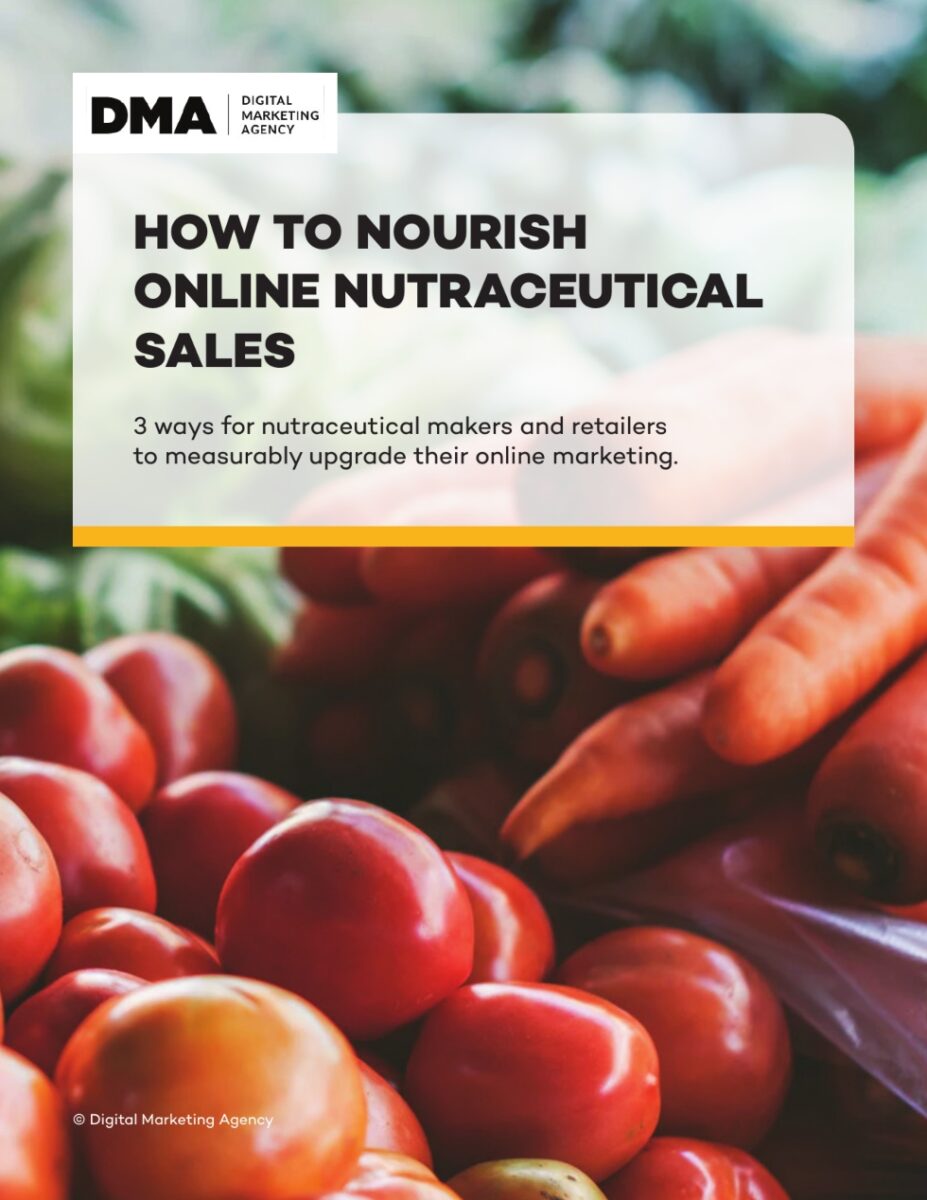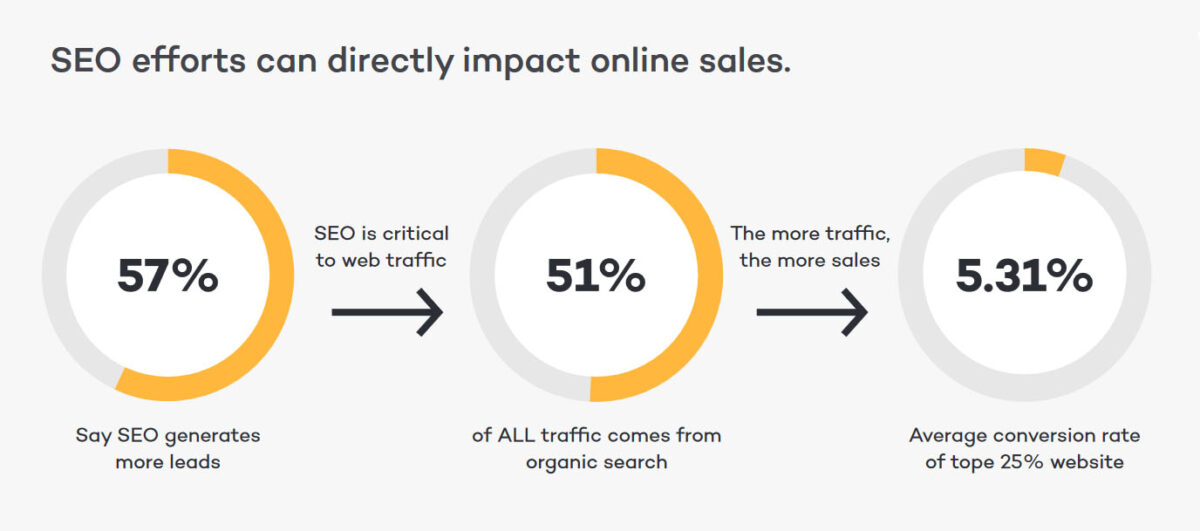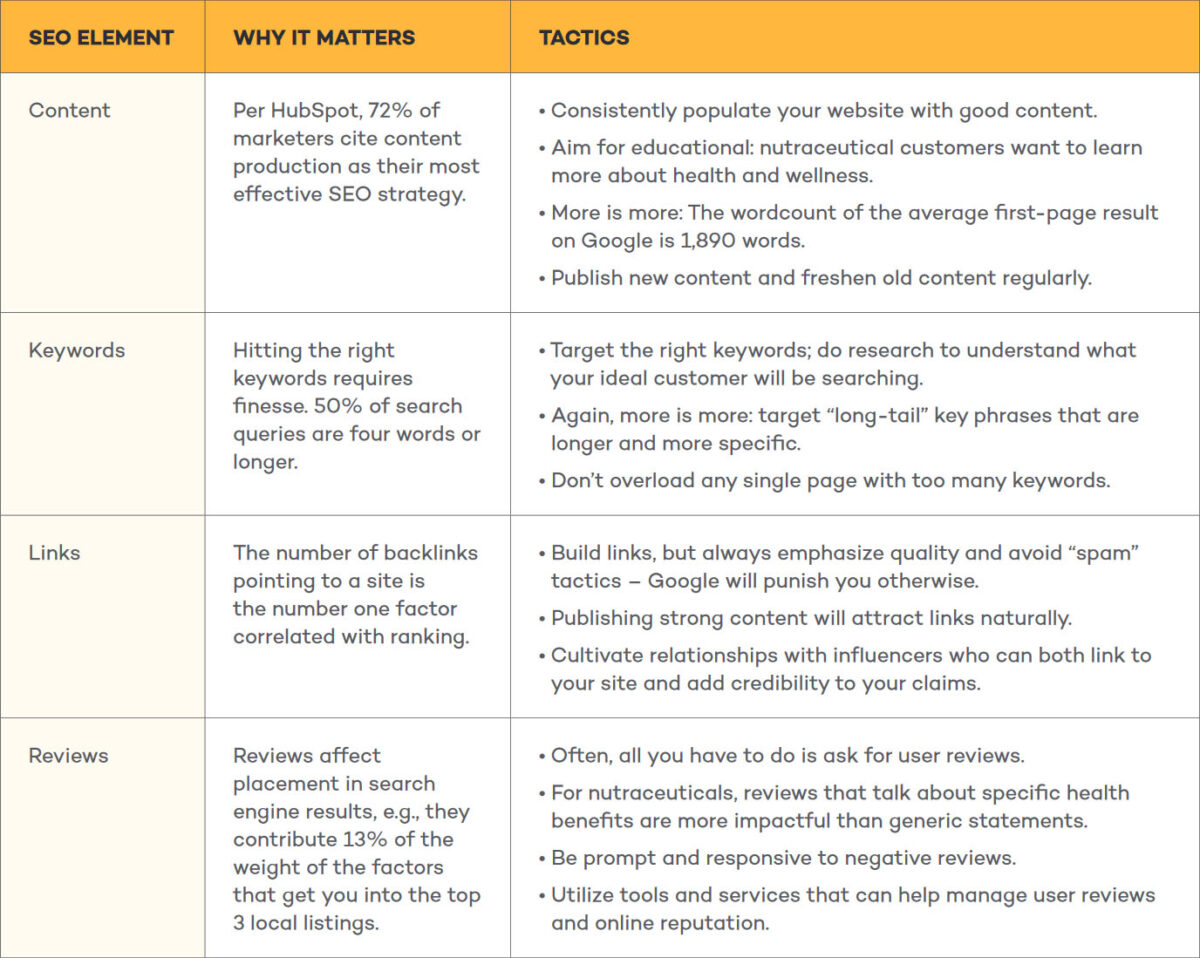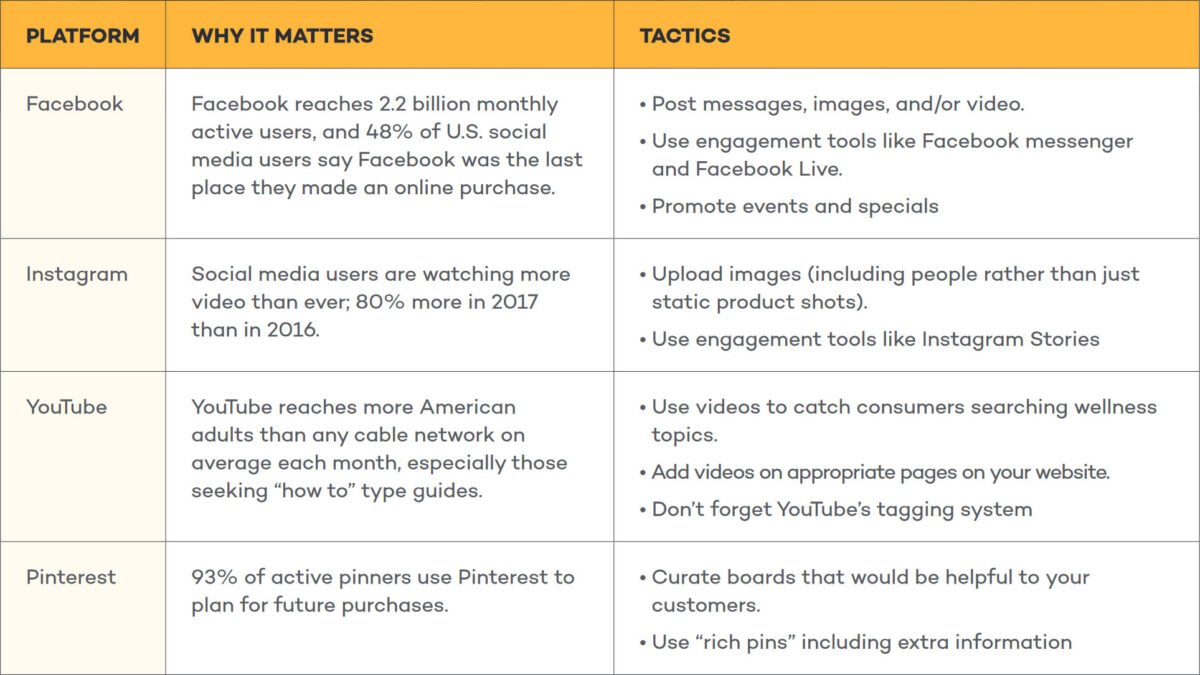SEO
Free SEO Analysis
SEO Services
Content Marketing Services
Local SEO
Link Building Services
Specialized SEO Services
PPC
REPUTATION MANAGEMENT
Free Reputation Management Analysis
Reputation Management Services
Review Management Services
Specialized Reputation Management Services
CEO Reputation Management
Brand Enhancement
Business and Directory Listings
Comprehensive Reputation Management Audit
SOCIAL MEDIA
Free Social Media Analysis
Specialized Social Services
WEB DEVELOPMENT
Free Website Analysis
Web Design Services
Mobile Development Services
Website Maintenance Services
Specialized Development Services
MARKETING AUTOMATION
Free Marketing Automation Analysis
Specialized Marketing Automation Services
Comprehensive Marketing Automation
INDUSTRIES
ABOUT DMA
WHITEPAPER
How To Nourish Online Nutraceutical Sales
Nutraceuticals
10th May 2022
Executive Summary
For nutraceuticals, social media presents a great opportunity to reach prospective consumers who may not have heard of your brand or the specific offering.
Good content is a fundamental aspect of any good SEO program, and many pieces will be primed for sharing via social media.
A variety of content formats can address distinct customer questions and needs at a variety of points during the shopping lifecycle.

Nutraceuticals are booking, but with increased opportunity comes increased competition.
Nutraceuticals – a broad term that encompasses any consumable that contains ingredients or additives with medicinal or wellness benefits – are knocking sales out of the ballpark. Over half of U.S. adults take at least one dietary supplement.[i] Further, according to the Nutrition Business Journal, the total U.S. supplement sales grew 6.6% to $41.4 billion in 2016—adding $2.6 billion in new sales.[ii] In fact, since 1994, the number of dietary supplements marketed in the United States has swelled from about 4,000 to more than 75,000.
Those are huge numbers, and they’re not likely to shrink. According to industry analysts at McKinsey and Co., a variety of factors are continuing to drive this enormous growth, including:
An aging population;
Increased consumer awareness for preventative healthcare;
The rise of self-directed (self-diagnosing and self-treating) consumer;
Channel proliferation (like ecommerce); and
A shift from ingredient-focused messaging to broader brand positioning.
However, rapid growth also means rising competition and increased scrutiny, both of which will put more pressure on manufacturers and retailers to reach consumers with effective marketing and sales messages.
But how do you do that?
For nutraceutical manufacturers and retailers in particular, three areas stand out as critical keys to dominating the online space. This paper will introduce you to those areas, along with best practices that will enable you to stay competitive in a fast-growing market.
The future of the nutraceutical market is online.
How will you stand out in the ever more crowded online world?
Online sales in the US grew by 15.8% in 2017; this translated to an estimated total online spend of nearly $453 billion.[iv] Meanwhile, online sales of vitamins, minerals, and supplements specifically grew even faster than average – at a rate of 20% (from $2B to $2.4B) – according to TABS Analytics’ 10th Vitamins, Minerals and Supplements Study.[v]
That phenomenal growth rate is not likely to slow down.
As McKinsey writes in its report on the industry, "The primary driver of this has been retailers’ focused efforts on improving the online shopping experience through better online education and targeted marketing." Those trends are likely to continue as competition intensifies, and bigger players enter the field and introduce more sophisticated and user-friendly practices.
Amazon, for example, has created a site dedicated to nutraceutical products targeted for customers ages 50 and up. Others have integrated valuable services into their sites, like live chat options through which they can address customer questions in real-time and facilitate immediate sales.
Other sites are incorporating additional "wellness tools" that add further value for customers. For example, GNC offers an interactive vitamin guide that can help users identify which supplements would best meet their individual needs.
In short: competition is intensifying rapidly.
That said, be sure that you first lay a firm foundation for the site itself. An effective and competitive online presence in the nutraceutical space must be discoverable by consumers in the first place.
Search engine optimization yields traffic, which fuels sales in turn.
Why is search engine optimization (SEO) so critical? Math. A certain percentage of your web visitors will convert into customers (the industry average conversion rate in ecommerce is 2.35%).[vi] Remember, web traffic is dependent on your site's placement in search engine results; 75% of Google users never click past the first page.[vii] If you want the traffic, you need to rank high in search results.
However, SEO is a nuanced, multi-factor, multi-layered affair.
See the table on the next page for a breakdown of critical SEO-related activities. Please note that this is far from an exhaustive list. Google's algorithm for determining ranking is sophisticated, complex, and always evolving; Google changes it 500 to 600 times every year).[viii]
While a few elements stand out as particularly crucial – Andrey Lipattseve, Partner Development Manager and former Search Quality Senior Strategist at Google, says that high-quality content and link building are the top two signals used by Google to rank sites in search results – there are many more factors that influence ranking than you might imagine. User reviews, for example, can also boost placement in search results. Load times also affect ranking; if your website takes too long to load in a browser, your rank can fall.
The good news is that most SEO tactics do double-duty.
They bolster your site's standing with search engines like Google, while also making the site friendlier to, and more effective with, potential customers. For example, positive user reviews and reputation management will both strengthen your site's ranking and also allow satisfied customers to do your selling for you, convincing new customers to buy from you.
SEO efforts can directly impact online sales.

What's good for SEO in the nutraceutical space?

Social media is increasingly vital.
More than 80% of Americans have at least one social media account, and 76% of U.S. consumers have purchased a product they’ve seen in a brand’s social media post, often at a later date.[x] [xi] In other words, more than ever, social media is playing a robust role in the growth of ecommerce.
For nutraceuticals, social media presents a great opportunity to reach prospective consumers who may not have heard of your brand or the specific offering. In addition, clever social media campaigns can even burnish SEO activities, e.g., helping to build legitimate links to your site.

Trust, through transparency and good branding, is key to healthy sales.
Supplements and other health-oriented or medicinal consumables occupy a wild space right now. Regulatory oversight can be uneven, and many products are not required to go through the same certifications or inspections as food products. That can make it easier to bring nutraceutical products to market, but it also raises trust issues with savvy consumers who may be skeptical, suspicious, or uncertain about your products or about you as a vendor.
A study by the American Association for the Study of Liver Diseases (AASLD) discovered labeling inaccuracies on 113 out of 203 – over half! – herbal and dietary supplements examined.
“The honor system isn’t working,” says John Bradley, the editor in chief of Nutrition Business Journal. He argues that “cheating and malfeasance … even if committed only by a minority of players, is destroying public trust.”
And today’s “self-directed consumer” is more discerning than ever. Nutraceutical producers and retailers need to understand that this self-directed consumer will question them and their products, and it's critical to build trust with them.
For one thing, 86% consumers base their nutritional purchasing decisions on quality, and an equal number state proof that ingredients work is one of their top priorities when buying dietary/food supplements.[xii]
That means you have to produce enough communications and content to speak effectively to their concerns. As McKinsey writes, "Enhancing transparency of the ingredients and formulation of nutritional products will go a long way in helping build trust."
A variety of content formats can address distinct customer questions and needs at a variety of points during the shopping lifecycle. Simultaneously, good content is a fundamental aspect of any good SEO program, and many pieces will be primed for sharing via social media. For example, blog posts are excellent for capturing search engine traffic, particularly for those valuable long-tail keywords, while simultaneously educating and reassuring readers. Each post is simultaneously a new doorway into your site and an added plank in your sales messaging.
Case studies are another powerful form of content: by showcasing how your customers’ lives have changed for the better, you can credential your claims and convince otherwise hesitant shoppers to hit the “buy” button.
Conclusion
In a world in which nine out of ten consumers now turn to the Internet to resolve health queries and concerns, the nutraceutical industry faces excellent opportunities to build market share and find new customers.[xiii]
However, success in this space now requires companies to optimize their online presence and sales efforts. As a result, these new opportunities also introduce brand new challenges. Indeed, the “consumerization” of the healthcare industry as a whole has seen patients feeling empowered to demand greater transparency, accessibility, and responsiveness from wellness providers. When those qualities are not forthcoming, consumers will turn elsewhere to find them. Finally, with health costs rising, shoppers are also seeking more cost-effective means to manage their own well-being.
It’s here that nutraceutical companies stand poised to catch new customers. If you can reach these consumers online when and where they are seeking wellness information, through SEO and social media, with a strong brand message at the ready, you will be equipped to thrive as the market grows.
The information contained in this paper is for generalized informational and educational purposes only. It is not designed to substitute for, or replace, professional business advice. You must not rely on the information in the report as an alternative to professional business advice from an appropriately qualified professional. If you have any specific questions about any relevant subject matter, you should consult an appropriately qualified professional. Digital Marketing Agency does not represent, warrant, undertake or guarantee that the use of guidance in the report will lead to any particular outcome or result. The views and opinions expressed in this paper represent the opinion of the author(s) and do not necessarily represent the views or opinions of Digital Marketing Agency.
[i] http://www.sciencemag.org/news/2015/08/feature-revealing-hidden-dangers-dietary-supplements
[ii] https://2016.export.gov/industry/health/eg_main_114725.asp
[iii] https://www.mckinsey.com/business-functions/marketing-and-sales/our-insights/cashing-in-on-the-booming-market-for-dietary-supplements
[iv] https://www.practicalecommerce.com/2017-ecommerce-round-15-percent-growth-retail-apocalypse
[v] http://cdn2.hubspot.net/hubfs/544043/2017_Webinars/2017%20VMS/Whitepaper/Vitamins%20and%20Minerals%20Study%202017.pdf
[vi] https://www.wordstream.com/blog/ws/2014/03/17/what-is-a-good-conversion-rate
[vii] https://www.searchenginepeople.com/blog/40-unbelievable-seo-statistics-need-know.html#note-68961-20
[viii] https://moz.com/google-algorithm-change
[ix] https://www.rocketclicks.com/client-education/5-stats-that-prove-youre-falling-behind-by-ignoring-seo/
[x] https://www.statista.com/statistics/273476/percentage-of-us-population-with-a-social-network-profile/
[xi] http://pages.curalate.com/rs/496-DAU-231/images/Curalate_Consumer-Survey_Nov17_V4.pdf
[xii] https://www.mckinsey.com/business-functions/marketing-and-sales/our-insights/cashing-in-on-the-booming-market-for-dietary-supplements
[xiii] https://www.thinkwithgoogle.com/intl/en-aunz/marketing-resources/micro-moments/micro-moments-guide-how-australians-find-and-choose-health-services/
Our Sales team